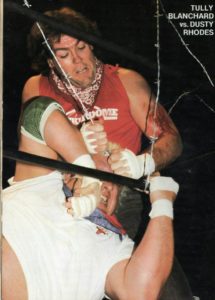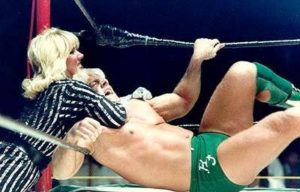From Hannibal TV
Growing up with Joe Blanchard as a father, who was also a wrestling promoter, was good for Tully as Blanchard took the time to support Tully’s athletic endeavors up to the point where he entered wrestling himself.
Papa Joe wrestled and played football in Canada. Tully was actually born north of the American border.
Joe worked with Fritz Von Erich to establish Texas wrestling. Joe ultimately became more well known for being a promoter than a wrestler. By the early 60’s, Joe figured out that being part of the office was more lucrative than being a journeyman wrestler.
Tully was a rarity once he broke in, as he was a promoter’s son who actually played a heel.
Southwest Wrestling was booming and actually grossed over 3-million dollars one year.
Tully Blanchard sold gimmicks, put up the ring and refereed for his father in his youth. He also played football well enough to earn a college scholarship.
Not pursuing a professional football career is a regret.
Tully is among the litany of wrestlers who attended West Texas State.
Papa Joe and Jose Lothario trained Tully for the mat wars.
There were a bunch of veteran wrestlers around who would kick your butt if you were not up to working smart and safe in the ring.
Blanchard was able to learn under Eddie Graham in his formative years, and then performed a stint for Jim Crockett. JCP had Wahoo McDaniel, Blackjack Mulligan, Ric Flair and other superstars to teach Blanchard how to get better at all aspects of the business.
Tully used this knowledge to help his father promote once he got back to Southeast Wrestling. Blanchard was booking at times, as well as Buck Robley, Dick Slater, McDaniel and the Sheepherders.
Southeast was on the USA network, thanks to paying them 7-grand a week to be put on the air. They also paid their wrestlers really well, and the two factors combined to sink the promotion. Blanchard ended up jumping to Jim Crockett Promotions in 1984.
Dory Funk Jr. worked Tully in a LONG match for the NWA world title. Blanchard blew up. Funk taught him a good lesson in how important endurance is to a worker.
Gino Hernandez was heavy into drugs and surrounded himself with some bad people. Blanchard tried to convince him to jump to JCP, but Hernandez liked the Dallas area and stayed there until his untimely death in 1986. Tully figures if he had gotten Gino to come to the Carolinas that Hernandez would still be alive. Blanchard is willing to buy into the theories that Gino may have been killed by drug dealers or whatnot.

By the early 80’s Blanchard was already deep into drugs and it lead to his financial ruin, as well as a collapse of his personal life.
Central States tried to give Blanchard a run in their area, but the weather was horrible, and the pay was terrible. Jim Crockett came in to visit for business and Blanchard convinced Crockett to bring him in to JCP to be a top heel.
JCP was struggling to draw fans in. Dory Funk Jr. was the head of the bookers, but several men were booking each state in the area individually, which led to some consistency issues. Dusty Rhodes came in mid-year to be the sole booker. Rhodes asked Blanchard for advice and ideas. Blanchard told him to put the best possible matches together and give the fans a show. This led to Flair working with Wahoo McDaniel and Blanchard.

They held a contest to find Tully a valet, which led hundreds of submissions, including some dirty pictures. Baby Doll was already a worker, and due to her unique size and look, she was brought in.
A fan attacked Blanchard and Baby Doll one night. Doll kicked his butt and then called the cops and had him arrested for assault.

Eventually the Horsemen came together as a faction. The promos they cut together were never scripted, and the ebb and flow came naturally as they played off each other.
The party lifestyle people think the Horsemen lived is a myth. The guys had a hard schedule and by the time they were done wrestling it was late in the evening, and most of the times all that followed was finding some food and having a few beers before bed.
Johnny Valentine told Blanchard that as a heel he should seek the audience’s respect, because if the fans felt you were skilled, they’d hate you even more for being a cheat.
Magnum T.A. had a thirst for excellence, so when he paired up with Blanchard and his high standards, it proved to be gold. Both men wanted to be the top guy and pushed the other to new heights.
Ole Anderson was fired from JCP, which set up Arn Anderson to switch to Blanchard as his consistent partner.
Barry Windham was as good as anyone in the business. The Horsemen showcased Windham as a single, with Tully and Arn taking on all tag team comers.
The Road Warriors style meshed well with Blanchard and Anderson as they kicked ass and the Horsemen knew how to sell and make the guys shine.

JCP was not paying Anderson and Blanchard what they felt they were worth, so they jumped to the WWF. They already had heat with JCP because Blanchard bad mouthed Rhodes’ booking to Ted Turner’s executives who were in the process of buying out JCP. Crockett called Blanchard and told him he was disloyal.
Crockett kicked Blanchard off the company plane as punishment for his actions. Blanchard called him up and asked what town he wanted the tag belts to change hands in because he and Arn were giving their notice.
The WWF had producers who wrote scripts for some of the national promos Blanchard had to cut. This was an uncomfortable thing to adapt to.

Dick Ebersol liked using Arn and Tully because they held ratings up on “Saturday Night’s Main Event” compared to other talents. The paydays were also very good for appearing on national TV.
Jim Neidhart was stiff, but he was a good hand.
Anderson and Blanchard had contract offers from the NWA for $750,000 to jump back at the end of 1989. The WWF was testing for cocaine after a number of their roster members had incidents while being drug addled. Tully was popped for cocaine and was suspended. Blanchard lost his NWA contract offer and never worked in a major company for any significant time ever again. He was only 35-years old and still in his prime.
WCW did offer him a contract in 1993, but the money was too low and Blanchard wouldn’t agree to their terms. WCW plugged him for weeks as appearing at Slamboree anyway, which upset Blanchard.
The WWF drug test failure led to Blanchard turning his life around and he began to follow the teachings of Jesus.
Blanchard worked a few shots for the AWA during their dying days in 1990. Tully had known Verne for years and years, so it wasn’t a big deal.
Terry Funk was supposed to beat Blanchard at Slamboree ’94 but Tully refused to do the job because the PPV was taking place in Philly, which was “Horsemen Country”. Blanchard figures that cost him a chance at a contract that year.
Shane Douglas worked a 60-minute draw with Tully at an ECW show. Tully gassed out at the 35-minute mark, which killed the match as the final 25-minutes stunk.
The “Legends of Wrestling” PPV debacle in 1999 saw Tully work with Stan Lane. They had a good bout. Blanchard has nothing to add about Jake the Snake’s drunken embarrassment of a match later that night as Tully avoided the situation.
Blanchard hurt his back in a lousy convention show ring, which made him decide to retire.
His daughter is now a worker. Blanchard tried doing a spot at a show with her and ending up tearing his bicep. That ended any future ideas of doing anything physical at his age.
Magnum T.A. ended up marrying Blanchard’s wife. Tully won’t comment on that situation.
The WWE interviewed Blanchard for a role as an agent, but his answers must not have satisfied the powers that be, as he walked away without a contract.
Preaching to prisons is a privilege and Tully is now focused on saving souls.
Final thoughts: The best shoot interviews are when the subject has nothing to lose and just tell it how it is. Tully proves to do this and delivers a solid and interesting interview.


